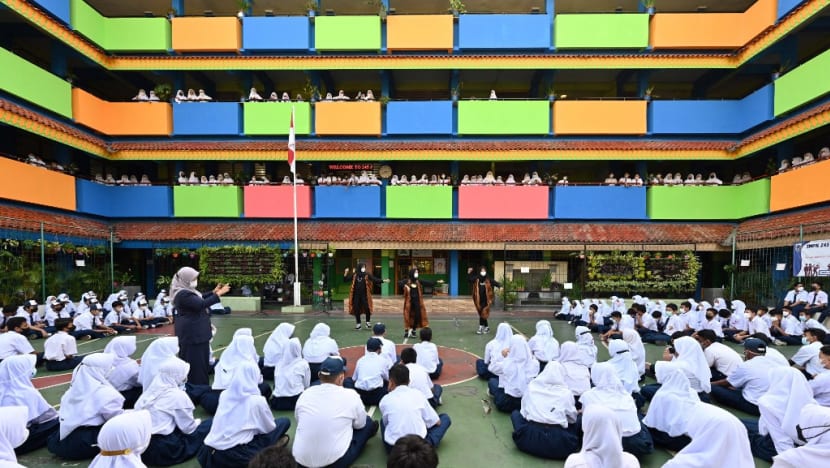'Emergency situation': Indonesian government to tap police in tackling school bullying, support group says barriers persist

SINGAPORE: The latest incident of an alleged school bullying case in Indonesia that went viral on social media has prompted the government to rope in the police force to help tackle the issue in schools.
It has also led House of Representatives speaker Puan Maharani to describe the issue as an “emergency” that requires the government to formulate a “comprehensive solution” to the problem.
On Tuesday (Oct 3), Coordinating Human Development and Culture Minister Muhadjir Effendy was quoted by state news agency Antara as saying that bullies should be criminally prosecuted under the country's juvenile justice system.
"I'll … talk with the National Police chief so that officers can be intensively involved in addressing bullying in schools,” he reportedly said.
According to Antara, Mr Effendy’s ministry - in cooperation with other ministries and institutions - is also looking to draw up rehabilitation measures for bullies.
He said that one of the main reasons why it is difficult to prevent bullying in schools is due to a lack of rehabilitation measures for perpetrators, adding that it is insufficient to rely on schools and students' families to stop violent behaviours.
Citing a recent viral bullying case in Cilacap, Central Java, Mr Effendy said: "The perpetrators in the Cilacap bullying case were expelled twice previously for assaulting other students.
“This means that expulsion is not enough to stop the students' violent behaviours. Some sort of rehabilitation efforts are necessary.”
The Cilacap bullying case went viral in September after an over four-minute clip made its rounds on social media, showing two students beating another student until he fell to the ground.
Dr Topo Santoso, a professor of criminal law at the University of Indonesia, told CNA that the government’s decision to rope in the police means that they may be able to work together to implement comprehensive anti-bullying policies which “emphasise prevention, early detection, and appropriate consequences for the perpetrators”.
"(They can also) establish accessible reporting mechanisms for students, parents, and school staff (members) to report incidents of bullying. This can include hotlines, online platforms, or dedicated officers at schools who are trained to handle bullying cases effectively and confidentially."
Dr Santoso added that the government and police could also collaborate with mental health professionals and counsellors to develop rehabilitation programs that address the underlying causes of bullying, such as anger management, empathy-building, and conflict resolution skills.
“By collaborating with the police, the government can ensure a more coordinated and comprehensive approach to handling bullying cases, which includes prevention, intervention, and appropriate consequences,” he said.
Meanwhile, the anti-bullying movement Sudah Dong - translated to English as Enough - told CNA that issues that need to be addressed include the inconsistent enforcement of anti-bullying laws and policies in Indonesia, as well as reporting barriers of such cases, among others.
Ms Tantri, a programme manager at Sudah Dong, stressed that the current laws also lack proper support for perpetrators.
“While it’s essential to hold perpetrators accountable, there is also a need for interventions that address the underlying causes of their behaviour, such as counselling and rehabilitation programs,” said Ms Tantri who, like many Indonesians, goes by one name.
She added that the inconsistent enforcement of anti-bullying laws and reporting barriers of bullying cases must also be addressed.
“Anti-bullying laws and school policies can be inconsistent across different regions and institutions. More collective efforts may be needed to ensure consistent implementation and monitoring,” she told CNA.
Ms Tantri added: “Some students may hesitate to report (instances of) bullying due to a fear of retaliation or lack of trust in the reporting process. Creating a safe and anonymous reporting mechanism can help address this issue.
“The teachers and parents must (also) make collective efforts to create a communicative environment that lets the students know that reporting is not only accepted, but more importantly expected. This obviously could work as preventative and control (measures).”
Other gaps in the current laws include a need to raise awareness about the rights and protections of students against bullying, a need to create more peer support programs, as well as a more updated and comprehensive data collection and research on the issue in order to create informed evidence-based policies and interventions, she said.
Indonesia currently has several measures in place to address bullying in schools and support bullying victims.
According to Ms Tantri, this includes national anti-bullying campaigns, hotlines to report bullying incidents, as well as a legal framework through the Education Law, Law on Child Protection and the Criminal Code.
“Some schools (usually private schools in big cities) have implemented anti-bullying policies that typically include consequences for perpetrators,” she added.
“Some schools (usually private schools) may (also) offer counselling service for students who have been bullied or are experiencing emotional distress due to bullying.”
Recent school bullying cases in Indonesia
1. Student bullied in Balikpapan, East Kalimantan on Sep 23, 2023 for making a move on bully’s girlfriend
A 13-year-old boy was beaten by two students from a different school after the former allegedly sent indecent messages to one of the bully’s girlfriend. In a viral video, the victim is seen crying in pain and being beaten continuously.
2. Seniors bully junior high school students in Bekasi, West Java in mid-September, 2023
In another viral video, several students are seen using sandals to hit others sitting on the ground as part of a tradition to instil leadership. The victims are believed to be the juniors of the perpetrators, according to local media. The perpetrators have since returned to school under strict supervision.
3. Five vocational school students beat up a schoolmate in Cimahi, West Java on Aug 18, 2023
In a viral video, five students were seen cornering a victim against a wall and kicking him repeatedly. According to Detik, the bullies were later arrested by the police, though the case did not continue as the issue was mediated by the families of those involved.
4. Six students bully a victim at a religious school in Asahan, North Sumatra on Aug 11, 2023
In early September, a video showing six students bullying and kicking a 15-year-old student went viral. The victim, who suffered serious injuries and trauma, had been bullied on multiple occasions before the video went viral, according to local media.
5. Student goes blind after allegedly being robbed in school at Gresik, East Java on Aug 7, 2023
An eight-year-old student went blind after being poked in the eye with a meatball skewer during an alleged robbery by a senior. The incident was reported to the police by the victim’s parents after the school was reluctant to provide closed-circuit television (CCTV) footage, according to local media.
6. Student suffers a broken bone after being bullied by schoolmates in Sukabumi, West Java on Feb, 2023
A student suffered a broken bone after two schoolmates pushed him, causing him to fall. The case went viral in September and ended peacefully after the perpetrators reportedly showed good faith, local media reported.
According to the Jakarta Post, citing the Federation of Indonesian Teachers Associations (FSGI), a total of 23 bullying cases were recorded in schools across the country this year, with 50 per cent of them taking place in middle schools.
"One elementary school student and one junior high school student have died this year following physical assaults from their peers," FSGI secretary-general Heru Purnomo said in a statement on Monday, according to the Jakarta Post.
"One bullying victim also suffered severe burns after being lit on fire by other students. Bullying also contributed to the suicide of two elementary students this year.”
He reportedly urged the education ministry to implement prevention measures in educational institutions in order to create a safe, comfortable and violence-free environment for students.
"It's also important to prioritise a restorative justice approach for bullies, since a lot of times they are only victims of their home situation or their environment," he was quoted as saying.
A restorative justice approach refers to a concept that focuses on mediation and rehabilitation rather than punishment.
Last Friday, House of Representatives speaker Puan Maharani said that the school bullying problem is an “emergency” situation in the country, and urged the government to formulate a comprehensive solution to the issue.
"The government should not let school bullying continue to happen without offering a comprehensive solution, especially when the perpetrators and victims are children," she was quoted as saying by Tempo.
"Schools should be a place to foster responsible, empathetic individuals with good behaviour and should not only focus on academic achievement,” she added.


















